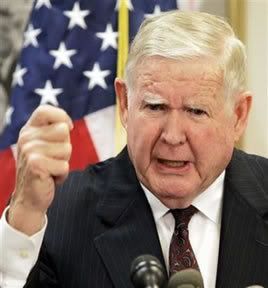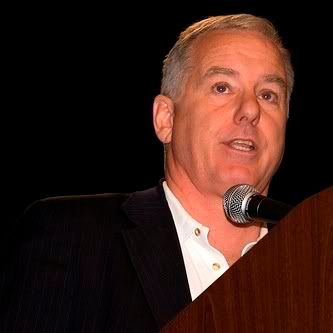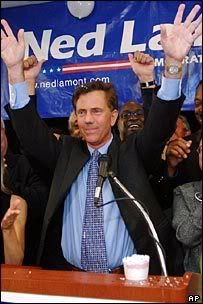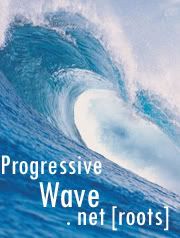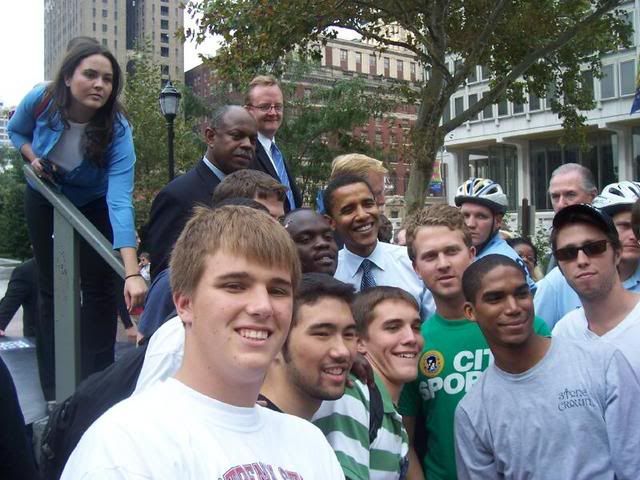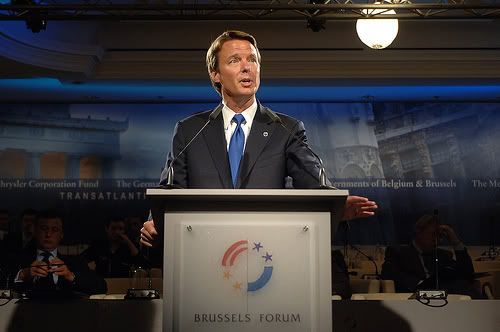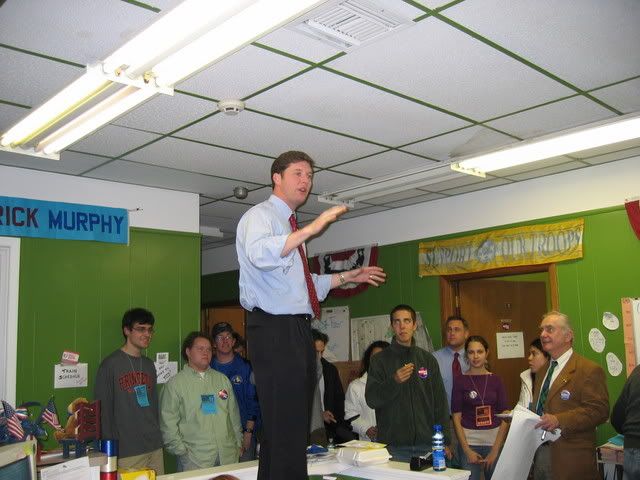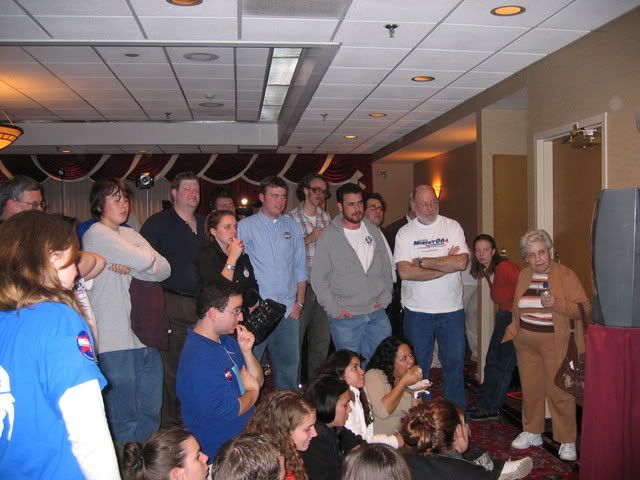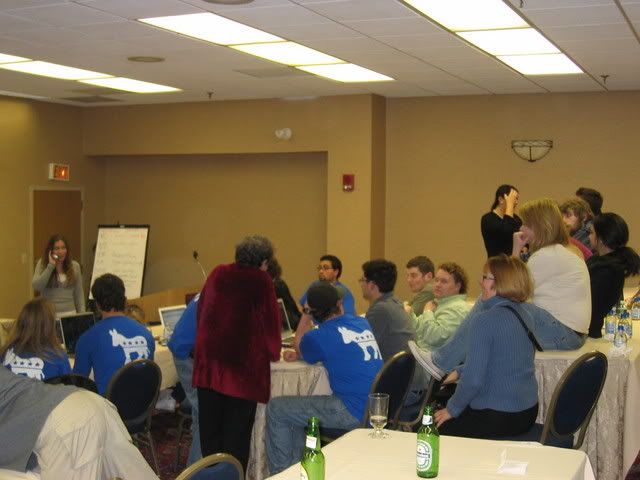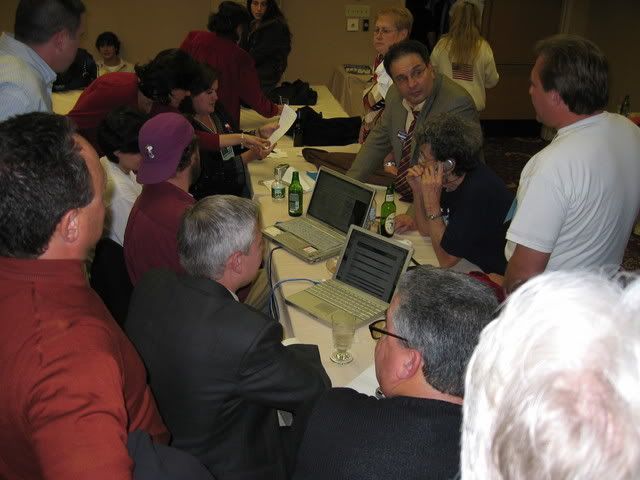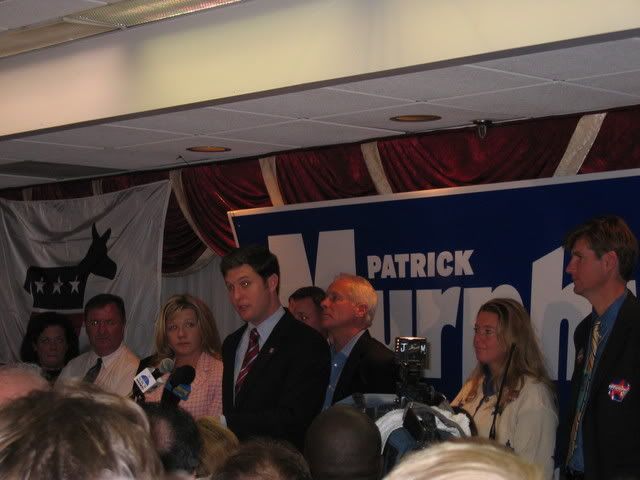(cross-posted at Deny My Freedom and Daily Kos)

I first met PA-08 Democratic candidate Patrick Murphy almost 1 year ago. It wasn’t a big event – we cleared leaves from the local YMCA parking lot and playgrounds with the other candidate in the running for the nomination, former Bucks County commissioner Andy Warren. I didn’t know much about Patrick, but I had heard his biography – Iraq war veteran, law professor, and all-around stand-up guy – and came away very impressed with him as a candidate. He’s come a long way since those days, when his candidacy was seen as something of a longshot due to being a political novice. Nevertheless, the latest polls show a very close race, and Patrick’s picked up the support of Democrats, Republicans, and independents throughout the district, as I’ve seen in the past.
Today was the last day I could volunteer for his campaign, but it was one hell of a day. Patrick’s going to be Representative Murphy in a few days, if this is any indication.
After getting a mere 3 1/2 hours of sleep, I hauled myself out of bed at the unseemly hour of 6:30 AM to meet up with a group of Penn College Democrats to attend an early-morning rally at the local Boilermaker union hall in Bucks County. Surprisingly, there were a dozen of us up at that early hour, mainly for one reason – former Vice President Al Gore was going to be attending the union rally, and that’s a chance in a lifetime that I wouldn’t miss for anything. After being adequately awakened by the below-freezing temperatures of the early morning, we piled into a couple of vans that staffers and volunteers had provided us with today. It was just the start of a very long day, but we managed to stay awake the whole ride, with some employing caffeine in its various forms (Starbucks coffee, Red Bull) to aid the process.
The Rally
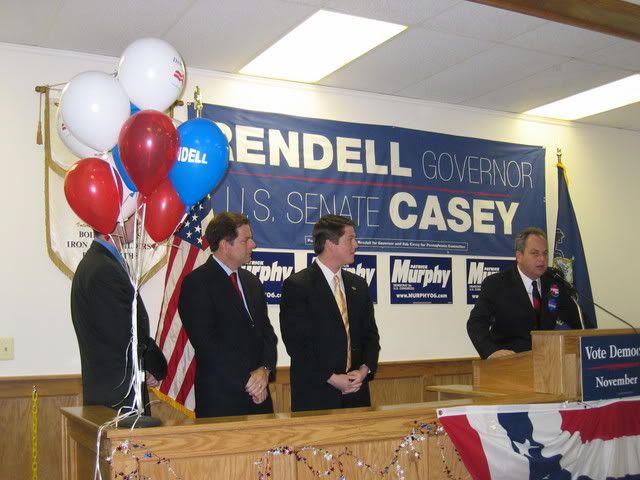
When we arrived, the union hall was already packed with supporters, and as usual, the local candidates were warming up the crowd. Chris King, candidate for the 142nd District of the PA State House (on the left, but obscured by the balloons) spoke first. The focus of his speech largely consisted of talking about health care. He noted one really mean-spirited attack – his opponent cited him for receiving ‘free’ health care when he was working for the state government. Yet it is his opponent who is taking money from the health insurance companies that are killing ordinary people with their rapidly rising premiums. Afterwards, John Galloway, the Democratic candidate for the 140th District of the State House, took the stage briefly – literally; he only spoke for one minute, so I honestly do not remember much of what he had to say. The next two speakers were 10th District State Senate candidate Chris Serpico and 6th District State Senate candidate Paul Lang, a disabled Coast Guard veteran who had initially been another potential challenger in the 8th Congressional District before he endorsed Patrick. As he spoke about the need to clean house in Harrisburg, a (previously) unnanounced guest came on the stage to take the floor with Patrick coming shortly behind.
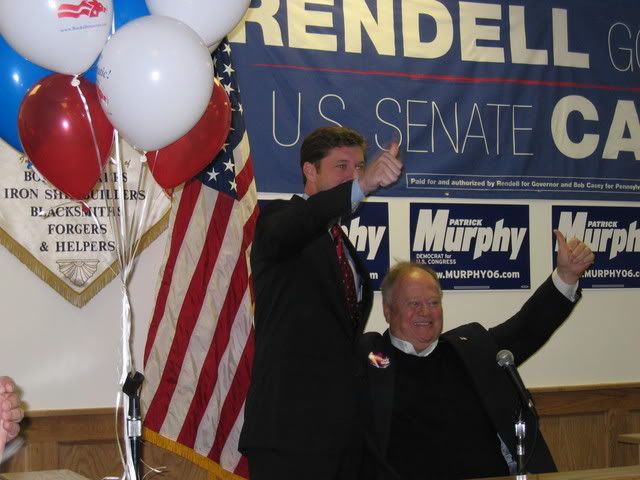
Former senator Max Cleland (D-GA), the victim of one of the worst smear jobs in the history of elected politics in our country, came onstage to a round of rousing applause. The man has led an incredible life after the Vietnam War, and his fighting spirit is still alive and well. He took numerous shots at the Republicans, noting that after Cheney had shot someone, “he was the only one with combat experience in the White House.” The crowd loved him, and I think that Cleland feeds off the energy he gets at these events. I don’t think he’s ever forgotten what happened to him in the 2002 election, and he brought a fire to his speech, talking about how much the Bush administration has screwed up. In addition, he took some good-natured ribbing at Patrick’s youth, noting how at West Point, Patrick was often mistaken as a cadet instead of the constitutional law professor that he was. It was then time for him to introduce Patrick as a man who will be getting two Christmas gifts – a newborn son and becoming the next Congressman from the 8th District. He got a similarly rousing round of applause from the crowd, and I think both he and Cleland are very close.
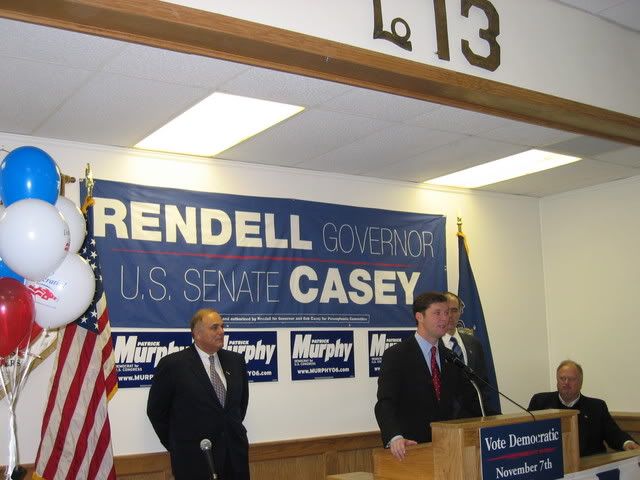
Initially, Patrick was supposed to be the very quick filler between Senator Cleland and the two Democrats at the top of the ticket in Pennsylvania, PA-Sen Democratic nominee Bob Casey, Jr. and Governor Ed Rendell. After speaking a little bit about what he saw in Iraq, he introduced Rendell and Casey – to a lot of music but no appearance. It was apparent that Rendell and Casey, who are touring the state together in these last days of the campaign, were late, so Patrick told them to shut the music off. “I won’t sing for you,” he laughed. “My wife said that if I ever sang at one of these rallies, she’d become a Republican again.” The crowd roared with laughter, and Patrick returned to speaking about the issues, particularly embryonic stem cell research (his opponent, freshman GOP Rep. Mike Fitzpatrick, voted against it twice). Rendell and Casey finally showed up, and Patrick spoke for only a little longer before giving way to the next Senator from Pennsylvania – the man who is going to end the sad career of Senator Rick Santorum – Bob Casey.
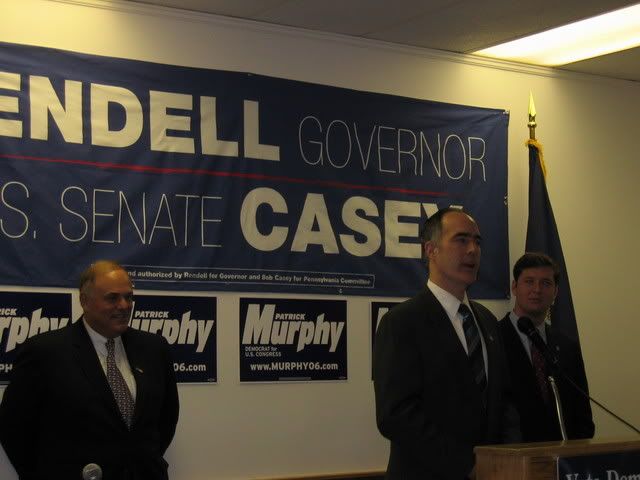
A lot of people have this image of Casey being a very technocratic, ‘wooden’ politician. The positions he’s held at the state level – Auditor General and State Treasurer – aren’t glamorous positions, but he has been very effective in doing the people’s work in those positions, particularly in discovering wasteful spending. But the perception is a bit off; as Atrios noted on Thursday, Casey is actually a very down-to-earth guy. He had great fun cracking jokes – he thanked Rendell for starting the ‘Casey, Casey’ chant, and he mocked Rick Santorum’s ads that showed his face followed by mushroom clouds. “Do you really think I can do that?” he asked in a rhetorically funny way; Cleland in particular got a good laugh out of that line. Casey largely spoke in generalities about the need for change in Washington – and running against Santorum, it’s easy enough to win an election simply by running against the status quo – but in particular, he noted two issues – health care and Iraq – that he wanted to work on when he got to Washington. He gave credit to Rendell, who’s been working on an initiative to get universal health care for all kids in Pennsylvania, and he said that Santorum has only come up with 2 new ideas since he arrived in Washington: privatizing Social Security and privatizing the National Weather Service. Of course, there have been numerous statements, notably one involving man and man’s best friend, but Casey has been able to stay ahead of Santorum without the need to rely on the particularly outrageous statements Santorum has made in the past.
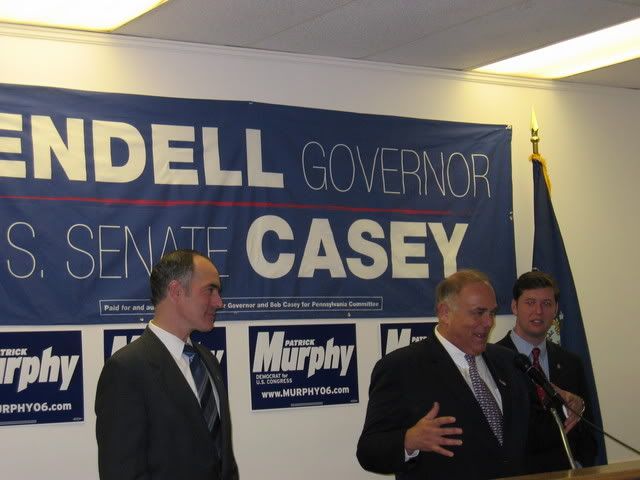
Rendell was the next speaker, and as is his style, he began by firing off a few quick crowd-pleasers. The man is the consummate politicians, and people in the Philadelphia area, including the suburbs, absolutely love him. He comes off as an ordinary guy just chatting with a group of people, and it’s no wonder that he is able to connect so quickly with people. After acknowledging Casey, Patrick, and Cleland, Rendell spoke about Fitzpatrick’s claim that Patrick does not have the requisite political experience to be a Congressman. In what is an obvious statement, he noted that his GOP opponent in the gubernatorial race – football player Lynn Swann (who Casey, if I recall correctly, said would be back to being an ABC sports broadcaster after the election) – is similarly lacking in political experience. It’s the hypocrisy that really sticks out, and Rendell called them out on it straight up. After letting ‘West Wing’ actress Melissa Fitzgerald take the floor for a few minutes, Rendell had the humorous task of announcing to the crowd that a car with a particular license plate number needed to be moved so that Gore could arrive. Although Rendell said he could ‘go on until 3 o’clock’ speaking about what he had done for Pennsylvania, he did overrun his time a little bit as he started speaking about education, the minimum wage, and alternative energy. He noted that the state was the largest producer of renewable energy east of the Mississippi.
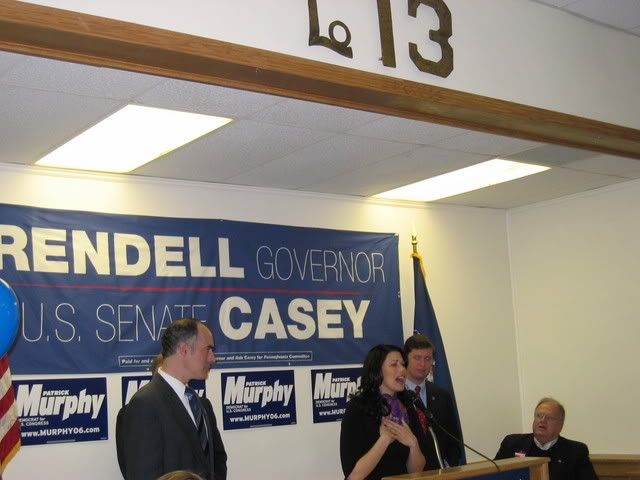
I’m not a West Wing junkie (I’ve only seen a couple random episodes of the show), so I’m not particularly familiar with the character that Melissa Fitzgerald portrayed on the show. Nevertheless, she certainly was a lively speaker (afterwards, Rendell asked the crowd, ‘Now what do you think about her as a candidate, eh?’), and she implored all of us to vote. The country has been heading down the wrong direction at an exceedingly fast pace, she stated, and that’s why we needed to do all we can to get Democrats elected. She spoke about the reason why we were all there – because we cared. It’s because of that deep-seated feeling that something is horribly wrong that we need to talk to each and every person and tell them to vote. She’s proud to be a Democrat, a Pennsylvanian, and it’s time for us to be proud to be American again.
After Rendell noted one of his accomplishments, the crowd applauded for longer than usual. Through the entrance in the back, it was clear that the man of the hour had finally arrived, and Rendell noted how this person had always been prescient, and how America ‘had made a huge mistake six years ago’. As the DNC chairman at the time, Rendell got to know him quite a bit, and it was a reunion of sorts when he was finally introduced by the governor as ‘the former Vice President of the United States, the best Vice President this country has ever had…Al Gore.’
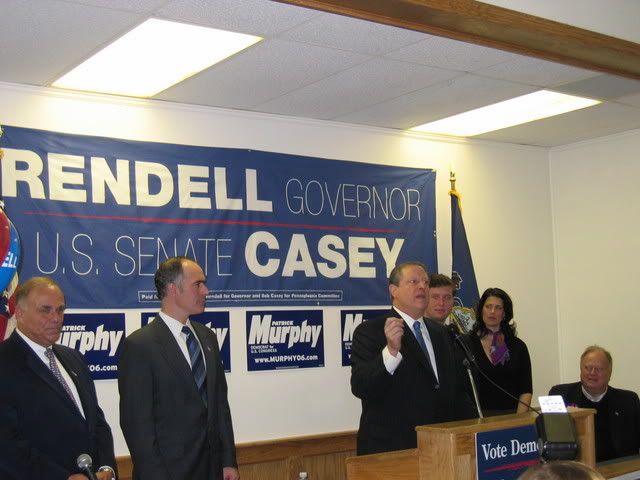
December 13, 2000 is a day that I will never forget. I was only 14 years old at the time, but watching Gore give his concession speech from the White House, one could sense that something terrible had gone wrong. You can watch An Inconvenient Truth and wonder what could have been, but it’s an entirely different experience when you see the person who should’ve been president speaking right in front of you. Gore opened with the usual niceties – Casey is a long-time friend of his; he lauded Rendell’s record on biofuels and non-pollutive sources of power such as the sun and the wind; he complimented Patrick on his excellent campaign; and he recounted an incident when he was a freshman Congressman in 1976. He couldn’t get his car to start, so he hitchhiked a ride back to his house. The person who gave him a ride? Max Cleland, who was then the Secretary of Veterans Affairs.
Although I was expecting Gore to mainly focus on environmental issues when he spoke, I was surprised at the tack he took. Aside from noting Rendell’s accomplishments, the vice president launched into a wonderful speech about the Founding Fathers. Clearly, he understood the context in which he was speaking. He spoke about Thomas Paine, Benjamin Franklin, and the rest of the the illustrious men who wrote the Constitution. In a moment of sadly humorous irony, Gore noted that they were resisting King George (he then went on to playfully chide Rendell that it wasn’t America’s fault 2000, a reference to the fact that he did win the popular vote; however, he did not press the matter further), and that when writing the Constitution, there was a reason that Congress – not the other branches of the government – was cited in Article I: it was meant to be an ‘independent check on the executive branch’. He noted how the Republican-controlled Congress had been a rubber stamp, agreeing to Bush’s requests even before a question was asked. If the Founders were to view what we had done today – whether it be going into Iraq, spying on our own citizens improperly, turning a budget surplus into record deficits – they would have been sorely disappointed. This fall, Gore told us, we were sending three messages: first, we were telling Dick Cheney that it’s a no-brainer that Democrats should be elected; second, we were sending a message to George W. Bush that we were going to ‘hold him accountable’ for what he has done (and has yet to do), a line that drew a lot of applause; and finally, that we were going to send a message to the Founders, from the state where the Constitution was written, that American democracy was still alive and well.
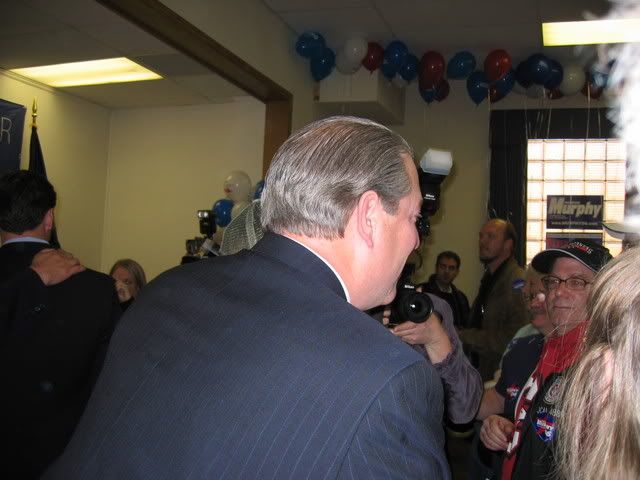
Al Gore could still be the president. He has the passion and the fire that so many Democrats lack nowadays. Afterwards, I absent-mindedly shook Rendell’s hand and greeted Patrick for what seemed like the millionth time before Gore made his way down to the rope line. I regret that I left my copy of the vice president’s extremely prescient Earth in the Balance at home, as having it autographed would have made my year. Nevertheless, he finally came around, and I knew he was running short on time (he was scheduled to hold similar rallies today with PA-07 Democratic candidate Joe Sestak), so I couldn’t ask him the question I really wanted. Besides, when you have your political idol standing in front of you, one tends to lose their train of thought. After shaking his hand – Gore has a ‘strong, firm’ shake, as they would say in ‘Seinfeld’ – I simply blurted out what was at the top of my mind, trying to speak as loud as I could with my weakened voice:
Me: Mr. Vice President, I hope you run in 2008.
Gore: (in a sincere voice) Thank you.
And then he was gone, left to briefly greet the other politicians and union leaders there before heading over to PA-07. Take from that what you will…but more than ever, we need Al Gore to be elected to the position he rightfully earned six years ago: president of the United States.
—–
The Ground Report
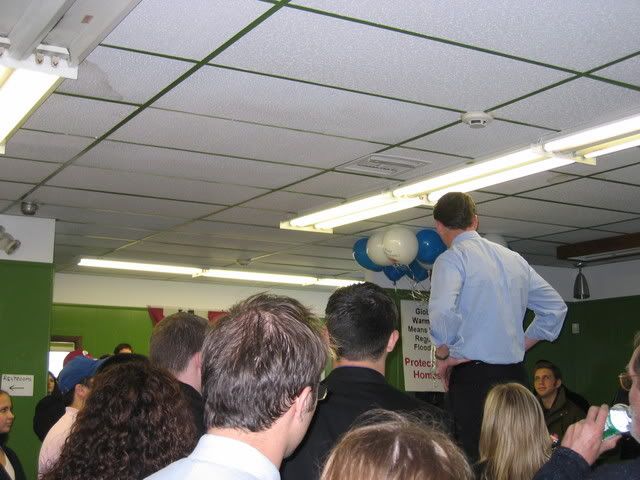
With only a few days before the election, everything comes down to how the GOTV operation is run. Patrick’s campaign is running like a well-oiled machine, with an apparatus that could possibly be even better than that of CT-Sen Democratic nominee Ned Lamont – and that’s saying something. Today, the office was bustling with way more volunteers than had been present in the past. Around noontime, shortly after I had come back from my first trip out into the field, Patrick addressed a massive influx of volunteers who had come to help out with the GOTV operation. Standing atop of the desk in the middle of the campaign headquarters, he thanked everyone for their help and gave them a brief rundown of what was going to be happening in the last few days. Everyone was enthusiastic, and it’s great to see Patrick take such an active involvement in meeting those who are volunteering their free time to make sure he gets elected. All day, people were flowing in and out of the office, and I would venture to say that there may have been over 100 volunteers – in this office alone. I was shocked to hear how many volunteers the campaign has signed up for Election Day; to say the least, it is going to be a spectacle to behold, and I’m just disappointed that I won’t be a part of it. I was so surprised that I asked a staffer if those volunteers included those from the Rendell/Casey GOTV operation (they are doing a joint one), but it’s true – the amazing number of volunteers are just for Patrick’s campaign alone.
Today’s objective wasn’t the typical canvassing. Instead, it was more of a race against the clock to see just how much ground we could cover, as time will be everything on Election Day. As I noted previously, the canvassing sheets were in great order once again – map on the front, addresses on the back, for a grand total of one sheet of paper. In the past, I had usually only covered one neighborhood in the afternoons; today, I was able to hit the streets in three different areas around the district as part of the effort to spread the word about Tuesday’s crucial vote. The neighborhoods I visited were, in order:
– a working-class neighborhood in Bristol:

– a working/middle-class neighborhood in Morrisville:

– a middle/upper-class neighborhood in Falls:

Because this was more of a time trial than anything else, I didn’t really stop and chat with the folks in the areas I visited. That being said, a couple of people spoke to me. As I approached one house, a very cute black dog approached me warily. Two guys standing by a truck across the street said, “Don’t worry, he won’t bite.” I gave the dog a pet, and they called out, “So you’re a Republican, eh?” I answered negatively, saying I was out hitting the streets for Rendell and Murphy. They nodded, saying, “It’s time for a change…we know who to vote for.” It’s good to hear that people are sick and tired of what’s been going on. A woman I spoke to in Falls noted that she’d received our flyer already, but she noted, “The system’s broken…it needs change.” We may be criticized for our policy stances, but simply put, people are well aware of the damage that unchecked GOP rule has caused to the country. They’re realizing that the madness, the insanity that this administration keeps pushing daily – it has to come to a stop. As I drove to and from canvassing, one driver noted that some enterprising individuals had put up a bunch of ‘Bush for Fitzpatrick’ signs around the county – and that they had all but been pulled out of the lawns that they had appeared in. A new lawn sign for Fitzpatrick spouted up today – ‘Working Families for Mike Fitzpatrick’ – but what is that supposed to mean? It’s not a political party, as it is in New York; instead, it’s just another effort by Fitzpatrick to position himself further and further away from the Republican Party. For example, let’s peruse a piece of direct-mail literature that the incumbent is sending out:
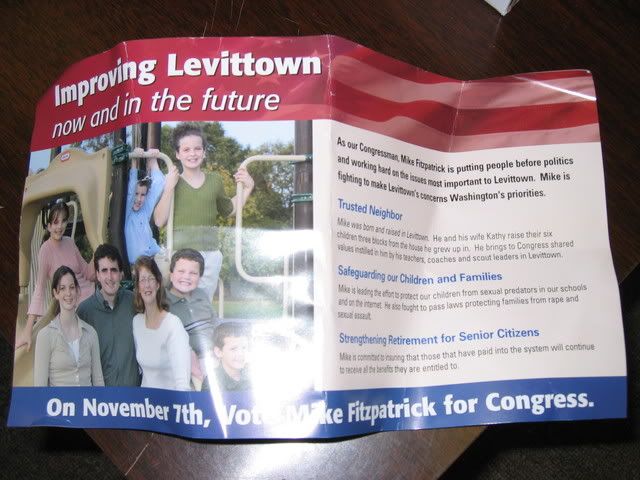
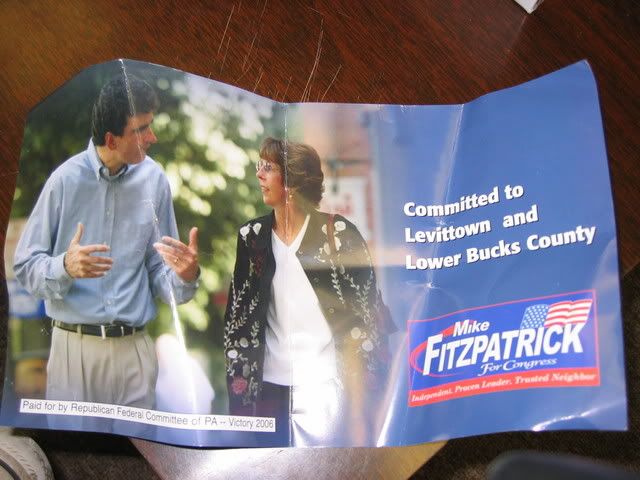
Notice that nowhere on the flyer does it mention that Fitzpatrick is a Republican. All of his campaign signs do not state his party affiliation. The big signs around the district put at major intersections say ‘Elect Fitzpatrick’ – clearly trying to stem a possible anti-incumbent vote and trying to make low-information voters think he is a new face in town. But the more interesting piece of literature that Fitzpatrick’s canvassers were leaving – and the only acknowledgement to date that the 72-hour Republican GOTV operation is underway – is this:
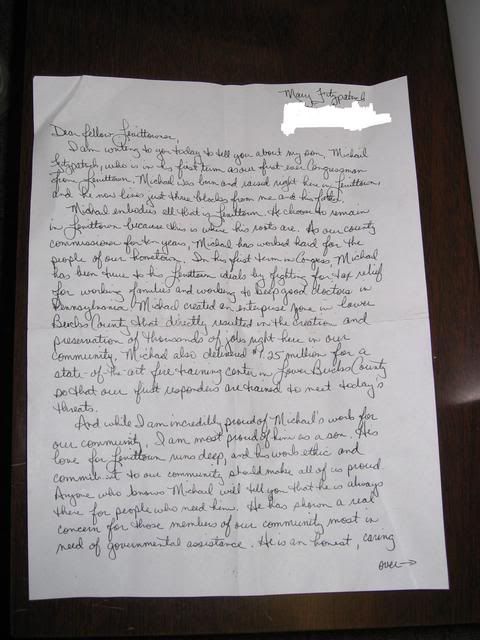
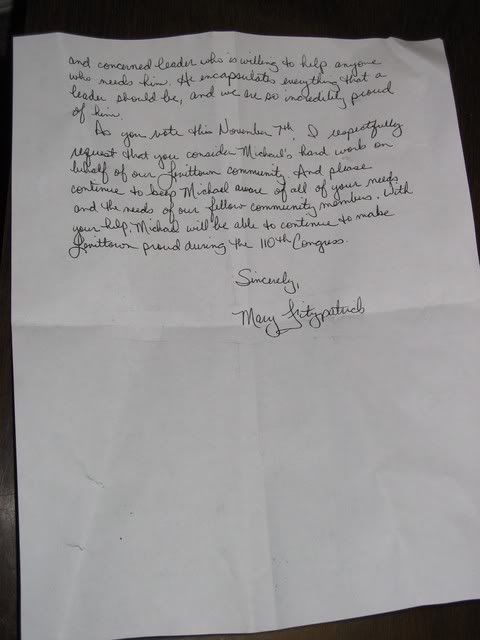
That’s a copied letter hand-written by Mike Fitzpatrick’s mother, courtesy of one of Patrick’s supporters who found it on their doorstep. In an attempt to make it seem even more personal, she wrote her home address on the top, which I painted over. To me, this is a clear sign of desperation on Fitzpatrick’s campaign. The letter isn’t even particularly substantive, as it tries to play on Fitzpatrick’s ties to the community (he was born there and has lived there his entire life) and on just how proud his mother is of him. I honestly don’t know how effective such a gambit may be; I would hope that voters are able to look past a transparently-designed political ploy and evaluate the candidates on the issues, not on what one family member says about their son. Nevertheless, I’m sure that a lot of people will be seeing this on their doors in the district soon enough. If another one of Patrick’s supporters receives it, perhaps they should actually pay Mrs. Fitzpatrick a visit and ask if her son shows ‘real concern’ for members of the community, why does he support continuing to put our soldiers in harm’s way in Iraq? Why does he vote against embryonic stem cell research, a science that could save the lives of millions who have no hope? I think it’s fair game; if she wants to put her address on the letter, it shows a clear willingness to engage in a discussion.
—–
Final Words
I first met Patrick last year, but as I’ve gotten to know him much better in the past 2 months, it’s clear that he will be an excellent representative that all of us – not just his constituents, but his supporters in the netroots community around the country – can be proud of. He is a true progressive, he has detailed policy positions, and he is someone who has a long, bright future ahead of him in politics. It’s been an honor volunteering my time for his campaign, and although I will not be available to help his GOTV operation, I will be liveblogging the post-election party. If you are available to volunteer any time between now and the election, please do so. If you need some inspiration, consider the excellent incentives the campaign is providing. It’s the best meal I had in a while:

As Al Gore said today, we, the people, are the fourth branch of this democracy. On Tuesday, not only in PA-08 but around the country, we will be heard again. The people of America will send a message loud and clear to the rest of the world, one that will be embodied by the likes of people such as Patrick.
It’s time for a change.

